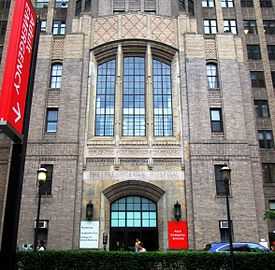Presbyterian Hospital (New York City)
Coordinates: 40°50′32″N 73°56′34″W / 40.842159°N 73.942823°W

Presbyterian Hospital in Manhattan, New York City, was founded by James Lenox in 1868, and began operations in 1872. It was originally located between East 70th and 71st Streets and Madison and Fourth (now Park) Avenues, and expanded continuously throughout the late 19th century, adding an outpatient dispensary in 1888, a school of nursing in 1892, and additional beds and services in 1892, 1893, 1904 and 1912.[1]
During the Spanish–American War, World War I and World War II, the hospital operated military wards or overseas hospital bases.[1]
In 1910, the hospital became affiliated with Columbia University's College of Physicians and Surgeons, and with numerous other hospitals and institutes in Manhattan,[1] including, in 1925, the Sloane Hospital for Women, a leader in obstetrics and gynecology that had been founded in 1886.[2] Other institutions with which the Presbyterian Hospital became affiliated with or incorporated into its organization, were the Vanderbilt Clinic, Babies Hospital, the Neurological Institute, and the New York State Psychiatric Institute.[1]
In 1925, the hospital and Columbia University began building the Columbia-Presbyterian Medical Center[3] – the first center of its type in the world – in the Washington Heights neighborhood. The hospital moved into its new James Gamble Rogers-designed facility, which included the Harkness Pavilion for private patients and the Squier Urology Clinic,[3] in 1928.[1] The center, now Columbia University Medical Center, is located between West 165th and 168th Streets, between Broadway and Riverside Drive.[1]
In 1998, Presbyterian Hospital merged with New York Hospital to form New York-Presbyterian Hospital, which has six campus, five in Manhattan, and one in Westchester County.
Architecture
The writer Henry James described the hospital in his 1907 book The American Scene as one of the few fine examples of architecture in Manhattan, describing it as an "exemplary Hospital" and expressing his admiration for the red-bricked building's ability to "invest itself with stillness. It was as if the clamorous city ... [was] forever at rest and no one was stepping lively for miles and miles. [...] I was won over, on the spot."[4]
In addition, the Federal Writer's Project's Guide to New York City, published in 1940, extolled the virtues of the Hospital's building, and the other original building of the Medical Center, as "among the pioneering structures of the late 1920's when traditional styles were being abandoned in favor of a utilitarian approach," with large flat windows to provide the maximum amount of natural light, but the AIA Guide to New York City says that they are "bulky and banal" and calls the streetscape "a bore".[3][5]
References
Notes
- ↑ 1.0 1.1 1.2 1.3 1.4 1.5 Mottus, Jane E. "Presbyterian Hospital" in Jackson, Kenneth T. (ed.), (2010) The Encyclopedia of New York City (2nd edition). New Haven: Yale University Press. ISBN 978-0-300-11465-2, p.1034
- ↑ "Sloane Hospital for Women (New York, N.Y.)". Columbia University Health Sciences Library. 2006. Archived from the original on June 9, 2007. Retrieved 2007-10-30.
- ↑ 3.0 3.1 3.2 Federal Writers' Project. (1939) New York City Guide. New York: Random House. ISBN 0-403-02921-X (Reprinted by Scholarly Press, 1976; often referred to as WPA Guide to New York City) pp.298–300
- ↑ James, Henry. The American Scene. London: Chapman and Hall,1907. p.188
- ↑ White, Norval & Willensky, Elliot with Leadon, Fran (2010). AIA Guide to New York City (5th ed.). New York: Oxford University Press. ISBN 9780195383867., p.564
External links
-
 Media related to Presbyterian Hospital (New York City) at Wikimedia Commons
Media related to Presbyterian Hospital (New York City) at Wikimedia Commons